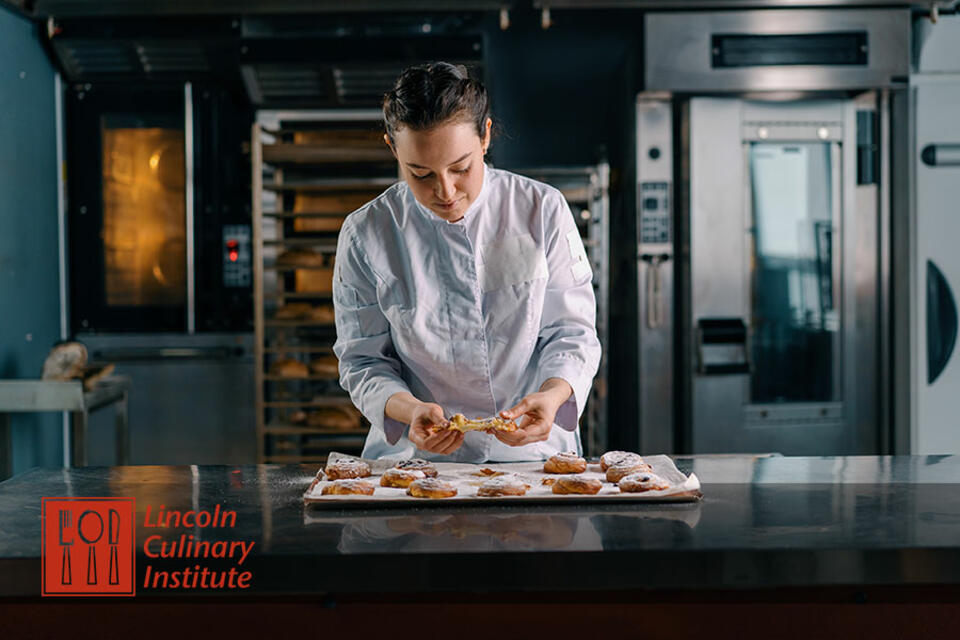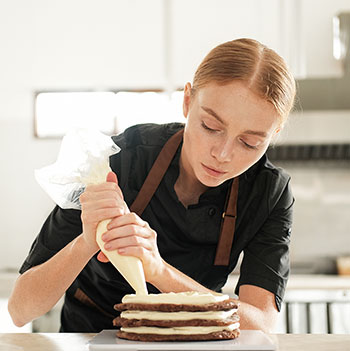How to Become a Pastry Chef: A Step-by-Step Guide


Austrian strudel, French croissants, Italian cannoli, Danish pastries, Greek baklava. Is that the kind of word association you go to when you think of travel? If you can’t pass by a bakery without stepping in. Or if you spend more time looking at the construction of the wedding cake than at the bride, you’re more than just a dessert person. You may have the makings of a pastry chef! To become a successful pâtissier, you need a passion for the art of desserts, technical baking knowhow, creativity for new desserts menus, and the customer service skills to keep a business thriving. Do you fit the profile? Find out with our step-by-step guide to becoming a pastry chef.
Step 1: Fuel Your Pastry Passion
Spend some time in your own kitchen experimenting with recipes and trying old and new baking techniques. Find out what you like and what you love about making desserts of all kinds, where your strengths are, and what you’re most curious about. And check out pastry chefs who’ve come before you—whether through cookbooks, YouTube, podcasts, or old cooking shows. And don’t forget to get out there and try every tasty dessert you can. When you’re blown away by a fancy dessert, ask yourself: Could I create that?
Step 2: Explore the Role of a Pastry Chef
A pastry chef is a culinary artist specializing in the creation of baked goods like pastries, desserts, bread, and confections. To take on the role, you need to combine artistic skills with technical expertise to craft visually appealing and sumptuously tasting treats. You bake pies, cakes, pastries, candies, chocolate, confections, and much more with technical accuracy and precision. You know how to pipe, sculpt, and decorate baked creations. And you’re a master of tools such as molds, pastry bags, torches, and candy thermometers to achieve the desired results. But baking is just one important aspect of this role. Pastry chefs actually handle much more:
Pastry Chefs Design Dessert Menus
Whether in a restaurant, at a hotel, or part of a catering team, as a pastry chef, you build out dessert menus that fit the establishment, the season, and the palate of the patrons. You may collaborate with other chefs or the restaurant manager to fit occasions, themes, and the main courses offered.
Create New Recipes as a Pastry Chef
To keep customers from getting bored with the menu, it’s up to you to create new recipes. This is where your creativity can really shine. You can craft new seasonal items or capitalize on food industry trends. Or, you can dream up unique ideas and test them out on the menu. The menu is only limited by your imagination.
Order Ingredients
As the pastry chef, you are responsible for ordering the type, quality, and quantity or all ingredients related to your craft. You make sure you have what you need when you need it, keeping track of your ingredient inventory. When the pantry runs low, you place orders with your vendors for more supplies, always keeping your budget in mind.
Train and Supervise Other Pastry Chefs
In small bakeries or pastry shops, you might be the sole pastry chef, but in large restaurants or kitchens, you may have a staff to oversee. It’s your job to train the new staff and supervise their work. You teach them how to recreate your recipes, follow the proper techniques, and how to present your dishes in an attractive way.
Maintain Safety and Quality Control
Any menu you create demands strict quality control. You should constantly taste test your recipes and check the work of your pastry chefs, to ensure the food you put out is consistent in quality and flavor. Safety standards are also essential and it’s up to you to ensure that the rest of the staff follows proper food control and kitchen safety protocol.
To be successful as a pastry chef, you need a passion for pastries and creativity to come up with new recipes. You need strong attention to detail, good time management, and good hand-eye coordination. To run an effective kitchen, you need to communicate well. And, like any hospitality career, being a pastry chef means having excellent customer service skills.
Step 3: Enroll in a Pastry Chef Training Program

A pastry chef program can teach you the fundamentals of the profession and give the opportunity to practice your craft. You learn about food and cooking chemistry, baking techniques, ingredient properties, flavor pairings, and decoration skills. You’re taught food safety, precise measurements, and temperature control. And through lessons and hands-on practice, you become familiar with various doughs, confections, and dessert types. You learn to use convection ovens, proof boxes, fryers, grills, giant mixers, deck ovens, flame torches, chocolate molds, air brush compressors, slicers, food processors, tart pans, and more.
A baking and pastry training program can also teach you about the food service industry, how a commercial kitchen operates, and how to create a menu. Look for a training program that offers opportunities to gain plenty of practice. The program should include state-of-the-art facilities that allow you to practice recipes and techniques. And your instructors should be knowledgeable pastry chefs who have deep experience in the industry.
Step 4: Master Pastry Techniques
To become a truly skilled pastry chef you need hours upon hours of practice. Spend quality time in the school kitchens and set aside some time to practice at home. If you struggle with a particular technique, ask for additional guidance from your instructors or watch online tutorials to figure out where you can improve. Practice, practice, practice.
Step 5: Gain Hands-On Experience as a Pastry Chef
To gain additional experience, you can participate in an externship. By working in a local pastry shop, restaurant, or hotel, you can hone your own pastry-making skills under the supervision of an experienced pastry chef. Look for a training program that includes externships in the curriculum. You could also seek out an apprenticeship and further develop your skills by working with a team of pastry chefs.
Step 6: Build Your Pastry Chef Resume
Certifications can help you stand out during the job search. They show employees that you are dedicated to the profession and validate your industry-approved knowledge and skills to do the job. The American Culinary Federation offers a variety of certifications that you can pursue including:
- Certified Fundamentals Pastry Cook – Certifies your knowledge of food safety and nutrition.
- Certified Pastry Culinarian – Validates your knowledge of basic pastry creation and food safety and nutrition.
- Certified Working Pastry Chef – Demonstrates your culinary knowledge, supervision skills, and nutrition and food safety.
Each certification requires you to pass a test, but the requirements for each certification can vary. For instance, the Certified Working Pastry Chef certification could require 4,000 hours of apprentice work or five years of work experience, amongst other pathways, while the other certificates only require training in pastry arts.
Step 7: Look for Baking and Pastry Chef Jobs
Where you work and how much you earn as a pastry chef will depend a lot on where you live. For example, demand for bakers is more than triple the national average in states like Maryland1 and Connecticut2. They also earn more than the national average in those states3,4. And as you search for a job, consider where you might want to work. Fine dining establishments and bakeries are common options, but you might also want to work for a hotel, resort, cruise ship, or theme park.
To find your first job, start at your school. Your instructors and classmates might know of openings. And you may be able to stay on at an externship as an employee if you prove yourself. But also be sure to look at:
- Online Job Boards: Check culinary-focused websites like Culinary Agents, Indeed, ZipRecruiter, and Glassdoor.
- LinkedIn: Search for pastry chef positions and follow relevant businesses to see new openings.
- Visit Bakeries/Restaurants: Go in person to inquire about job opportunities, especially at smaller establishments.
- Networking: Attend culinary events, join associations like the American Culinary Federation, and connect with industry professionals.
- Social Media: Follow local bakeries, hotels, and restaurants on Instagram or Facebook, where they often post job openings.
Step 8: Continue to Hone Your Pastry Chef Skills
If you flip through old cookbooks or look at dessert recipes from past decades, you find that tastes and trends change over time. As a pastry chef, you need to adapt to those changes and continue your culinary education, even as a seasoned professional. You can take continuing education courses through the American Culinary Foundation or even earn more advanced certifications to develop new skills and boost your resume.
If you’re ready to start your culinary education, contact Lincoln Technical Institute today. We offer an International Baking and Pastry training program that can prepare you for entry-level work in the field. Our faculty have years of experience and can train you in our real-world facilities. Gain hands-on experience through our externships and interview with a representative from Disney through our industry partnership. Fill out the form to learn more.
References:
1 O*Net: https://www.onetonline.org/link/localtrends/51-3011.00?st=MD Retrieved October 3, 2024
2 O*Net: https://www.onetonline.org/link/localtrends/51-3011.00?st=CT Retrieved October 3, 2024
3 O*Net: https://www.onetonline.org/link/localwages/51-3011.00?st=MD Retrieved October 3, 2024
4 O*Net: https://www.onetonline.org/link/localwages/51-3011.00?st=CT Retrieved October 3, 2024
- Tags
- Pastry Chef,
- Baking
